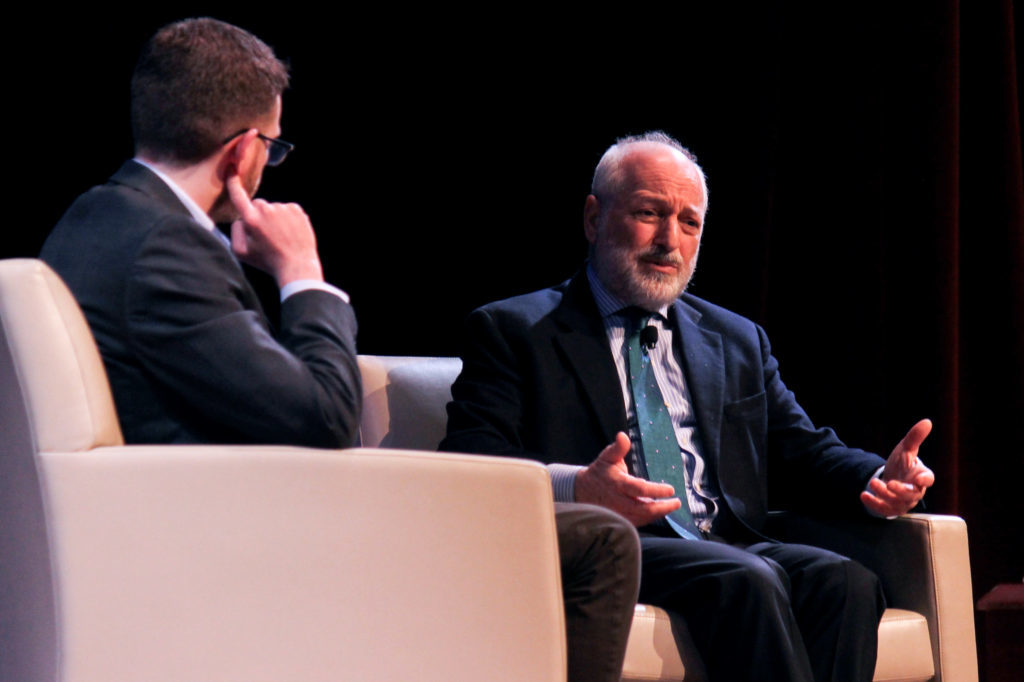When André Aciman first published “Call Me By Your Name” in 2007, he expected his book to be overlooked – even after learning it would be adapted into a film.
Aciman, an author and literature professor at the City University of New York, sat down with pop culture writer for The Atlantic Spencer Kornhaber Friday at Lisner Auditorium to discuss the unexpected success of the book and film.
Set in Italy during the 1980s, the novel and film follow the love story of 17-year-old Elio, played in the film by Timothée Chalamet, and 24-year-old graduate student Oliver, played by Armie Hammer. The film adaptation released last year came more than a decade after the book and was nominated for four Academy Awards, including Best Picture.
Here are three highlights from the event:
1. Producing a film
For the first decade after publishing his novel, Aciman expected little public attention. Producers Peter Spears and Howard Rosenman bought the screen rights before the book was even published, but for years had difficulties developing the movie – unable to find a director to suit the project.
When it finally reached the film circuit, Aciman said he was shocked by the interest in his story, not expecting to ever achieve notoriety for his art.
“Next thing I know, I’m constantly traveling to different places and it’s unbelievable,” he said. “My parents are dead, but it’s the kind of thing they would gloat on and tell me ‘take whatever it is and go with it.'”
Aciman had a minimal role in making the film, but during his two-day visit on set, he was asked to make a cameo by the director, he said. Aciman and Spears played a gay couple who visit Elio’s family summer house. Aciman said while he appeared on set, he asked to not have any lines, in fear of messing them up.
2. Story behind the name
In the novel, Oliver asks Elio to address him by Elio’s name, and in response, Oliver calls Elio, “Oliver.” This plot gave the work its name and Aciman said the detail was inspired by two friends – a lesbian couple that shared the same name. He said he also liked the title because it describes how lovers can become synchronized with each others’ thoughts and feelings.
“We love people who make us love ourselves, there’s no question about that,” Aciman said. “If you fall in love with someone who doesn’t make you like who you are, it is impossible.”
To portray a love story for an LGBTQ audience, Aciman said he tried to avoid politics or other stresses of the world to keep the mood of the film “natural and easy.”
“I wanted none of these surreal facts from life,” he said. “I wanted them not to intrude on what was not really an erotic utopia, but was nonetheless a moment of when two people abandon everything that would have impeded them and simply find what I think is the best thing that two human beings can experience ever – which is intimacy.”
3. Soft-boiled eggs and peaches
Aciman said he employed the motif of food to further amplify the sexual tension between the two characters. In the work, Elio and Oliver would flirt over breakfast, with Elio reaching over to crack Oliver’s soft-boiled eggs.
The author said he dislikes writing about sex, but that doesn’t show in one scene of the book and film in which Elio engages in a sexual act with a peach. The author said he knew the scene would be strange, but decided to trust his gut and keep it in the story.
“Would you plan such a thing?” Aciman said. “It just came upon me and I said, ‘Okay, I’m going to have fun with it.’”
He is still unsure why or how the peach scene came to him, but he said he is pleased with how Chalamet performed it in the film.
“I was playing with it and I thought, ‘I’m going to leave it in and if the editor thinks it’s ridiculous, we will cut it out,’” he said. “Little did I know, it was going to be like an emblem.”





